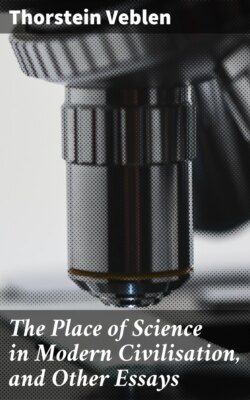Читать книгу The Place of Science in Modern Civilisation, and Other Essays - Thorstein Veblen - Страница 3
На сайте Литреса книга снята с продажи.
FOOTNOTES:
ОглавлениеTable of Contents
[1] Reprinted by permission from The American Journal of Sociology, Vol. XI, March, 1906.
[2] Jacques Loeb, Heliotropismus der Thiere, and Comparative Psychology and Physiology of the Brain.
[3] Cf. Gross, Spiele der Thiere, chap. 2 (esp. pp. 65–76), and chap. 5; The Play of Man, Part III, sec. 3; Spencer, Principles of Psychology, secs. 533–35.
[4] The myths and legendary lore of the Eskimo, the Pueblo Indians, and some tribes of the northwest coast afford good instances of such idle creations. Cf. various Reports of the Bureau of American Ethnology; also, e.g., Tylor, Primitive Culture, esp. the chapters on "Mythology" and "Animism."
[5] "Pragmatic" is here used in a more restricted sense than the distinctively pragmatic school of modern psychologists would commonly assign the term. "Pragmatic," "teleological," and the like terms have been extended to cover imputation of purpose as well as conversion to use. It is not intended to criticise this ambiguous use of terms, nor to correct it; but the terms are here used only in the latter sense, which alone belongs to them by force of early usage and etymology. "Pragmatic" knowledge, therefore, is such as is designed to serve an expedient end for the knower, and is here contrasted with the imputation of expedient conduct to the facts observed. The reason for preserving this distinction is simply the present need of a simple term by which to mark the distinction between worldly wisdom and idle learning.
[6] Cf. Ward, Pure Sociology, esp. pp. 437–48.
[7] Cf., e.g., Tylor, Primitive Culture, chap. 8.
[8] Cf. James, Psychology, chap. 9, esp. sec. 5.
[9] As currently employed, the term "pragmatic" is made to cover both conduct looking to the agent's preferential advantage, expedient conduct, and workmanship directed to the production of things that may or may not be of advantage to the agent. If the term be taken in the latter meaning, the culture of modern times is no less "pragmatic" than that of the Middle Ages. It is here intended to be used in the former sense.
[10] Epistemologically speaking, activity is imputed to phenomena for the purpose of organising them into a dramatically consistent system.
[11] Cf., e.g., Karl Pearson, Grammar of Science, and compare his ideal of inert magnitudes as set forth in his exposition with his actual work as shown in chaps. 9, 10, and 12, and more particularly in his discussions of "Mother Right" and related topics in The Chances of Death.
[12] Cf. James, Psychology, Vol. II, chap. 28, pp. 633–71, esp. p. 640 note.
[13] Cf. Ward, Principles of Psychology, pp. 439–43.
